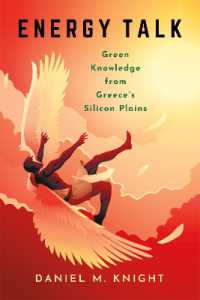- ホーム
- > 洋書
- > 英文書
- > Literary Criticism
Full Description
If you woke to realize that you could rewrite your yesterday without knowing the kind of tomorrow it would grant you, would you do it? Are the authors of our destiny working with an outline or spit-balling confusing plotlines? Since the past changes possible futures, to what alighting butterfly should we pay the most heed? This book explores the liminal space between speculative fiction and the historical novel. Staged as a transnational, multicultural conversation, it takes up a call originally made by Fredric Jameson in Archaeologies of the Future wherein he describes that flashpoint between speculative and historical genres as "the symptom of a mutation in our relationship to historical time itself." Drawing together postcolonial, feminist, cultural, Indigenous, and cognitive approaches, Science Fiction and the Historical Novel asks what the past can offer a future-oriented world, and how the future can be imagined in relation to a past that seeks narratives of inevitability rather than possibility. Engaged with the idea of the past as a model for the future, authors in this volume probe the extent to which historical scripts delimit possibilities, and how authors engaged with the practice of alternative pasts rewrite potentialities in the present.
Contents
Introduction
Ian P. MacDonald and Kate Polak
The Future of the Historical Novel: Freedom and Salvation in Jo Walton's Lent
Phillip Wegner
Bad China and Good Chinese Fiction: What We Don't Understand in Liu Cixin's Three-Body Trilogy
Cao Xuenan
"I Go Backward, Look Forward, As the Porcupine Does": History, Indigenous Futurity and Decolonizing the Culture Concept in Ursula Le Guin's The Left Hand of Darkness and Always Coming Home
Eric Aronoff
Realist Apocalypse and Pessimistic Aesthetics in Animal's People and The God of Small Things
Rebecca Oh
Back to Gilead's Future: (Re)visions of Critical Dystopia in Margaret Atwood's The Testaments
Luke Rodewald
'A Poor Sort of Memory': Jamais Vu and the Historian as Archive in Tade Thompson's Wormwood Trilogy
Ian MacDonald
Constructing a Post-Neoliberal Consciousness: The 1980s and/as Now in Ian McEwan's Machines Like Me
Jackson Ayres
Literary Activism, Fresh Registers and Ecocritical Debates in Immaculate Innocent Acan's Short Stories
Edgar Nabutanyi
Settler Colonialism, Resource Extraction, and the Future of Canada: Reading Cherie Dimaline's The Marrow Thieves
Shannon Lodoen
Imagining Past, Present, and Future: Totalization and the Face-to-Face Encounter in Carmen Boullosa's Heavens on Earth
Preston Waltrip
"The Shape of Power is Always the Same": The Power as Exposure Therapy
Kate Polak
Reimagining Contagion in Stephen Graham Jones's The Bird Is Gone: A Monograph Manifesto
Gabriella Friedman
Critical Afterword
Gerry Canavan







